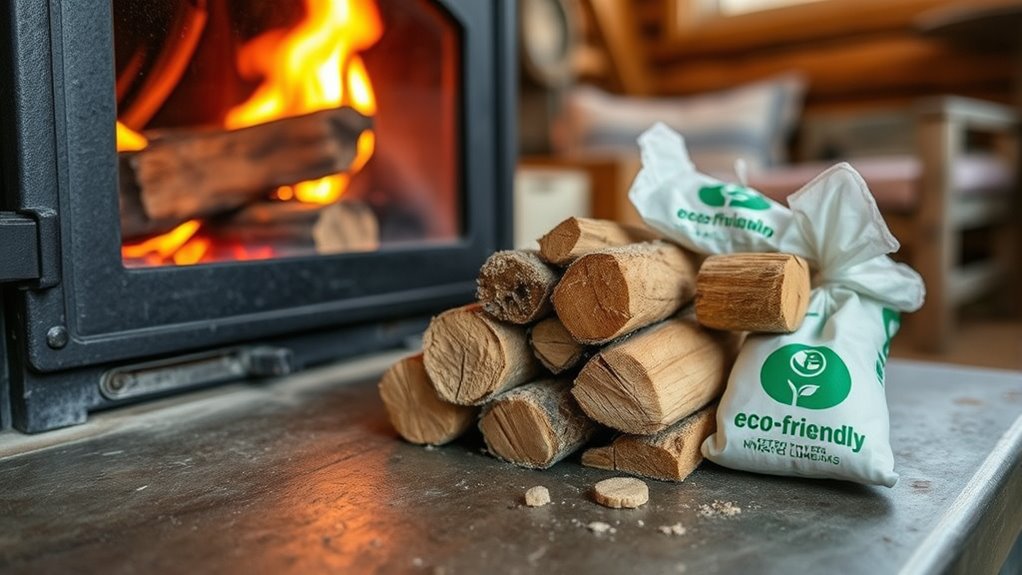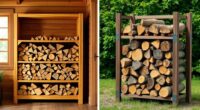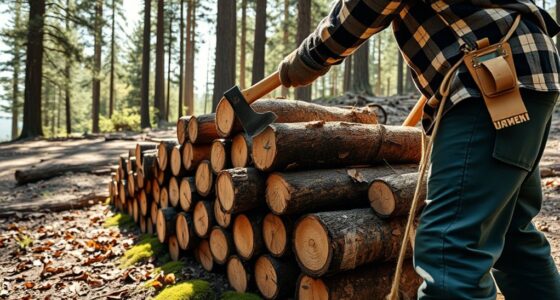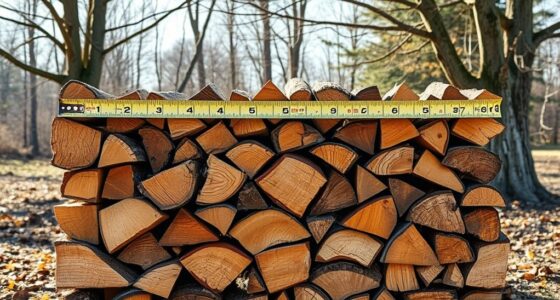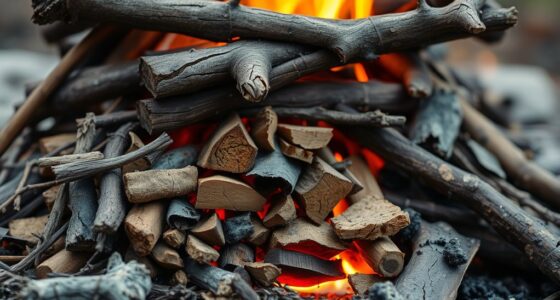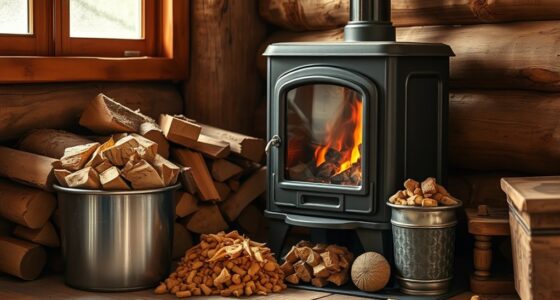To avoid risks, never burn treated wood or trash in your stove. Treated wood releases toxic fumes that harm your health and damage your chimney, while trash like plastics or paper can cause dangerous flare-ups and pollution. Use only natural, untreated firewood and dispose of waste properly. Staying mindful of safe materials keeps your fire safer and cleaner. Keep these tips in mind, and you’ll discover more ways to protect yourself and your environment.
Key Takeaways
- Only burn natural, untreated firewood to prevent toxic fumes and chemical exposure.
- Avoid burning trash, plastics, or treated wood that release hazardous fumes and increase fire risks.
- Properly dispose of trash in waste containers instead of burning it in your stove or outdoor fire.
- Regularly clean your chimney to prevent creosote buildup from safe, appropriate wood burning.
- Follow local regulations and guidelines to ensure safe and environmentally friendly burning practices.

Have you ever wondered about the hidden risks of using treated wood or tossing trash in outdoor spaces? When you burn or dispose of these materials in your stove or outdoor fire pits, you may be unknowingly exposing yourself and your loved ones to serious health hazards. Treated wood often contains chemicals like preservatives and pesticides designed to prevent rot and pests. When burned, these chemicals release hazardous chemical fumes into the air, which can be harmful when inhaled. These fumes can irritate your respiratory system, cause headaches, or even lead to long-term health issues. Furthermore, the chemicals released from treated wood aren’t just dangerous to breathe; they can settle onto nearby surfaces and soil, creating a lingering environmental risk.
Beyond the chemical dangers, using treated wood and trash in your stove considerably increases fire hazards. Treated wood burns unevenly and can produce unpredictable flare-ups, making it harder to control your fire. The chemicals in treated wood can also cause the fire to produce more smoke and toxic fumes, which can quickly fill your space with dangerous air. This not only puts your health at risk but also poses a real threat of accidental fires. Burning trash, such as plastics, paper with inks, or other non-wood materials, adds to these hazards, as they often contain substances that ignite easily and burn with intense heat. This can quickly lead to dangerous flare-ups or even wildfires if you’re not careful.
Using improper materials in your stove also increases the risk of creosote buildup, which is a flammable substance that can accumulate in the chimney or flue. When combined with the unpredictable nature of burning treated wood or trash, this buildup raises the probability of chimney fires, which can cause significant property damage and threaten safety. Plus, the smoke and fumes from burning trash contribute to air pollution, harming not only your health but also the environment. Incorporating emerging clean combustion technologies can help reduce these risks and promote safer burning practices.
To keep your home and outdoor spaces safe, it’s best to avoid burning treated wood and trash altogether. Stick to natural, untreated firewood, and dispose of trash in proper waste containers. Not only will you reduce the risk of chemical exposure and fire hazards, but you’ll also help protect the environment. Remember, the safety of your family and your property depends on the choices you make about what you burn. Being mindful of these risks ensures you enjoy a safer, cleaner, and healthier outdoor experience.
Frequently Asked Questions
How Can I Identify Treated Wood Safely?
To identify treated wood safely, you should focus on wood identification and safe detection methods. Look for signs like green or dark streaks, unusual odors, or a shiny surface from chemical treatments. If you’re unsure, avoid burning any wood that looks suspicious or has a chemical smell. When in doubt, consult a professional or use a test kit to guarantee your wood is untreated and safe for burning.
Are There Eco-Friendly Alternatives to Treated Wood?
Yes, you can choose eco-friendly options like wood treated with natural preservatives such as borates or mineral-based preservatives. These alternatives are safer for the environment and your health. Look for sustainably harvested wood or reclaimed wood, which reduces the need for chemical treatments. By selecting natural preservatives and eco-friendly options, you guarantee your stove use remains safe and environmentally conscious without relying on chemically treated wood.
What Are the Health Risks of Burning Trash?
Burning trash poses serious health risks because of chemical dangers and smoke hazards. You risk inhaling toxic chemicals from plastics, treated wood, and other waste, which can cause respiratory problems, cancer, and other health issues. Smoke hazards from burning trash also contribute to air pollution and can harm your lungs. To keep yourself safe, avoid burning trash altogether, and choose environmentally friendly alternatives for heat and disposal.
Can Certain Types of Trash Be Recycled Instead?
Yes, some trash can be recycled instead of burned. You should explore recycling options available in your area and practice trash segregation to separate recyclable materials like paper, plastic, and metal from non-recyclables. By doing this, you reduce the amount of waste you burn, helping protect your health and the environment. Proper recycling and trash segregation make a significant difference in minimizing pollution and conserving resources.
How Do I Dispose of Unwanted Wood Properly?
You should dispose of unwanted wood by avoiding chemical-treated types, as they can release harmful fumes. Proper disposal methods include taking untreated wood to a local recycling center or composting if suitable. Never burn treated wood or trash, as the chemicals can contaminate your air and stove. Always check local regulations for disposal options, ensuring you’re following safe, environmentally friendly practices that prevent chemical exposure and pollution.
Conclusion
Think of your stove as a trusted garden, where only healthy plants should grow. Toss in treated wood or trash, and you risk poisoning your entire harvest. By avoiding these hazards, you’re nurturing a safe, clean environment for warmth and comfort. Keep your stove’s flame pure and bright, like a well-tended garden in full bloom. Stay vigilant, and your home will flourish with safe, cozy fires—free from hidden dangers lurking in trash or treated wood.

